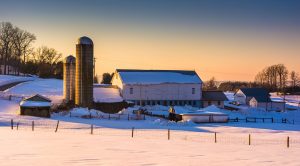While decreased daylight can mean increased challenges for farmers raising livestock, a new study indicates that agriculture is among the job sectors that benefit the most from Daylight Saving Time coming to an end.
The study, completed by business consulting firm Venture Smart, lists agriculture, forestry, fishing, and hunting as the sixth highest industry on a list of 12 sectors that most benefit from the end of DST.
Venture Smarter analyzed data from the U.S. Bureau of Labor Statistics on the number of night shift workers in each industry, to name the professions that will benefit the most from an additional hour’s pay.
The analysis is based on the proportion of night shift workers in each industry who will benefit most from an extra hour’s pay, as well as a change in routine. In the study, the percentage of workers on night shifts in agriculture is 2.9 percent.
Speaking on the findings, a spokesperson for Venture Smarter says, “Daylight Saving Time ending can have both positive and negative effects on night shift workers, but the main appeal is an additional hour’s pay — at least for the workers who are reimbursed by their employers correctly.

What does Daylight Saving Time really mean for agriculture?
It’s funny to think of if you’re part of an industry that often gets up before the sun, no matter the time on the clock. In fact, AgAmerica notes that Daylight Saving Time might actually affect the amount of time being put in by farm workers. With hired hands waiting an extra hour for daylight to start working gin the morning, they’ll still leave at the same time at night. And less work gets done.
DST hasn’t historically been popular with farmers. And it’s no wonder — cattle certainly don’t care what time the clock says when it comes time for being milked or fed. According to History.com, agriculturalists lobbied against DST in 1919, just a year after the U.S. began implementing it.
In 2018, U.S. Sen. Marco Rubio (R-FL) introduced the Sunshine Protection Act to the Senate to permanently adopt Daylight Saving Time nationwide.
In 2022, the bill was passed in the Senate by unanimous consent, but the House of Representatives failed to pass its companion bill when lawmakers couldn’t agree on adopting permanent Daylight Saving Time or permanent Standard Time. The bill hasn’t seen movement in 2023.
»Related: Old Farmers’ Almanac 2024 forecast: ‘Get Ready for a Winter Wonderland’


